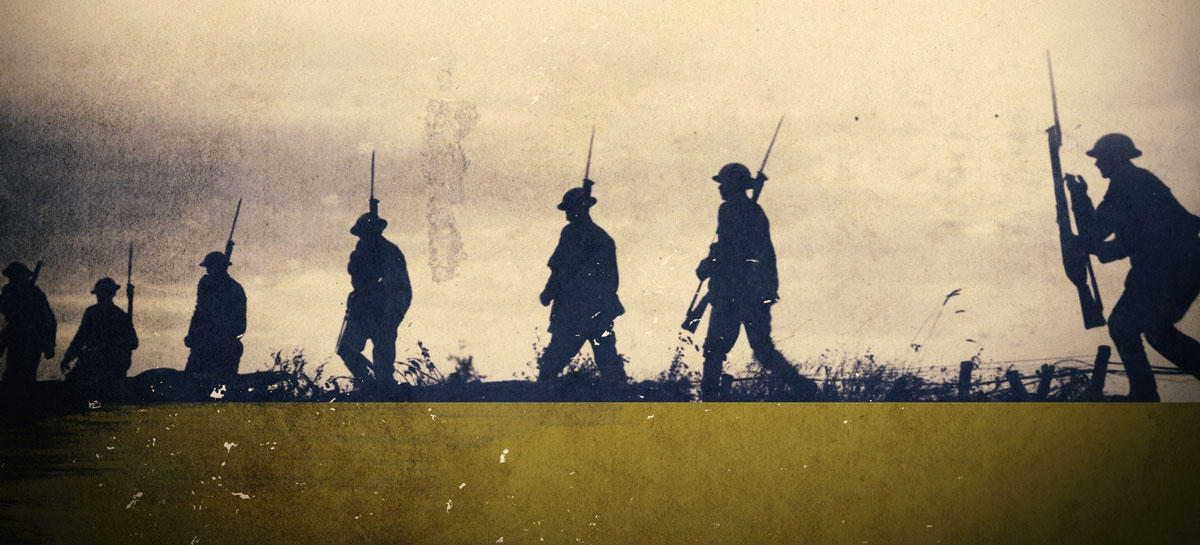History Channel recalls the most significant episodes of the modern era
“The World War: 1914-1945”, a succession of mistakes, ambition and courage
With the war in Ukraine, the biggest conflict in Europe since 1945, the world has returned to a level of high-risk tensions.
It is in this challenging context that Canal HISTÓRIA exclusively premieres “The World War: 1914 – 1945”, an original drama series that explores the two world conflicts as a single one: a continuous narrative of mistakes, ambition, revolution, and courage, to see between March 6th and March 27th, at 10:15 pm.
“World War: 1914 – 1945” makes it possible to understand the most violent and significant historical episodes of the modern era over eight episodes, shown every Monday in March in double sessions, at 10:15 pm and 11:05 pm.
Analyzing the causes and effects of these conflicts from new angles and taking advantage of the retrospective to reconstitute the way in which the world was at war during most of the 20th century, the viewer is invited to reflect on the profound consequences that occurred in the world.
In the first episode, aired on March 6, at 10:15 pm, “The Winter of the World (1914)”, Canal HISTÓRIA recalls how an assassination in Sarajevo and the strengthening of alliances in Europe, laid the foundations for a war that was decided by a small handful of men.
In the second episode, shown right after, at 23:05, “O Fim da Estrada (1914-18)”, the outbreak of World War I is framed and how, in an attempt to establish peace, legislators and leaders created the scenario for the Second Great War.
EPISODIC SYNOPSES
The Winter of the World (1914)
Monday, March 6 at 10:15 pm
The Hohenzollern, Habsburg, Ottoman, and Romanov empires dominated Europe. Three of them were centuries old; that of the Habsburgs, only 50 years. Therefore, when Slavic nationalism began to grow, the Habsburgs set out to eradicate it. Everything goes terribly wrong when, on a diplomatic mission to Sarajevo, Archduke Franz Ferdinand of the House of Habsburg is assassinated by Slavic nationalist Gavrilo Princip. The death of a European noble was not enough to start a world war, but Europe strengthened alliances and laid the foundations for what was to come. The coalition between France and Russia, with British involvement, would become known as the Triple Entente. Its counterpoint was the Triple Alliance, which united Germany with Austria and Italy. And although the British Foreign Secretary, Sir Edward Grey, told Winston Churchill that they would issue an ultimatum to Germany to stop the invasion of Belgium, even he recognized that war was inevitable. And so Europe went to war, with the fate of the world decided by a small handful of men.
The End of the Road (1914-18)
Monday, March 6 at 11:05 pm
World War I breaks out, which brings with it trench warfare, toxic gas, rapid-fire artillery, machine guns, armored vehicles, and planes. If soldiers had to endure fighting and extreme conditions, civilians were dealing with food shortages and bombings of their towns and cities. From the Battle of Verdun to the Battle of the Somme, men on both sides were lost, and the empires that initially dominated began to fail, with Germany and England claiming the superiority of their respective alliances. The insidiousness of ethnic cleansing appears, with the Armenian Genocide, under the close observation of a young Adolfo Hitler. Russia joins the revolution, with the fall of the Romanovs and other empires, as the bitter end of the world conflict approaches. The winner was given the spoils, so the Treaty of Versailles served to benefit the Triple Entente with huge compensations demanded from Germany. Thus, in an attempt to establish peace, legislators, and leaders created the stage for World War II.
More Greed (1919-29)
Monday, March 13th at 10:15 pm
After Versailles, US President Woodrow Wilson’s ’14 Points’ give way to the founding of the League of Nations… without the country of its creator as a member. The Habsburg Empire is divided into several countries with their own governments and compensations imposed on entry. Japan leaves the Treaty of Versailles with a bitter aftertaste when it sees its racial equality clause rejected, and Italy does the same, dissatisfied with the result. Disaffected politicians and military leaders look on, and the seeds of World War II are sown many years earlier. Riding the revolution, Stalin emerges as the leader of the Bolsheviks, and, in Munich, the German Workers’ Party takes on a new designation: Nationalsozialistische Deutsche Arbeiterpartei, or ‘Nazi Party’, as it would become known. Its main attraction is Adolfo Hitler.
We Will Be Winners (1929-35)
Monday, March 13th at 11:05 pm
The Jazz Age was one of hedonism for some; for others, a mere aside, as the war continued, in their minds and hearts. The Depression controlled the world and, although most countries went through difficulties, others took the opportunity to continue to dispute territories. The Mukden Incident saw Japan invade China and occupy Manchuria, and many historians consider it the true start of World War II. But was I finished? In Germany, an ambitious Hitler seeks the Chancellery and begins to define the course of History. In Germany and Russia, books were already being burned. Stalin was beginning to leave his legacy, with the ‘Holodomor’ in Ukraine, and countless other acts of death and destruction. While US President Franklin Delano Roosevelt was trying to lift the country out of the Depression, the world was on the brink of yet another world war.
Force Alone (1935-39)
Monday, March 20th at 10:15 pm
Hitler’s invasion of the Rhineland was a risk that paid good dividends, with no one controlling his advance west. In Spain, the Civil War began, fueled by Germany, Italy, and Russia. At its core, an ideological battle: Fascism vs. Communism, mirroring the war between German Nazism and Russian Communism. As with the Rhineland, the British did nothing, with European factions forming and realigning. On July 7, 1937, there was a shooting on the Marco Polo Bridge near Beijing. It was a theater for Japan to justify invading China on a large scale. While Chamberlain promoted ‘conciliation’ with Hitler, Hitler used Pan-Germanism as a justification for invading Czechoslovakia and later Austria. When European leaders came together in an artificial attempt to maintain ‘peace’, for many, ‘Kristallnacht’ signaled the many horrors to come.
Can’t Lose (1939-41)
Monday, March 20th at 11:05 pm
Alliances were crucial. After a slight in Munich, the Soviets make a convenient pact with the Germans, at a time when the world is rushing into a new world conflict. With the invasion of Poland, the farce of peace disappeared, and France and Great Britain declared war on Germany. With initial losses in the Ardennes and Dunkirk, Italy joins the Axis and declares war on the enemy, thinking it won’t last long – and so it seemed. With the fall of France in 1940, the Axis victory seemed inevitable. But Churchill foresaw it all… ‘The Battle of France is lost,’ he said. ‘I presume the Battle of Britain will follow.’ And so the war took to the skies, pitting the RAF against the Luftwaffe. With interim battles in Armenia and Greece, Hitler’s war in the east was being postponed. But when it unfolded, it was epic – Operation Barbarossa. It would be an annihilating war, but the German Army had not presented itself to the Soviets with its seemingly infinite number of men, and Stalin intended to fight to the last soldier. However, in a country as vast as the USSR, the thirst for victory needed a grain of reality…
On the Road to World Domination (1941-44)
Monday, March 27th at 10:15 pm
With the Germans trapped in the freezing Soviet winter, the outcome of Operation Barbarossa was not as expected. Stalin listened to his generals, who gambled on the bravery of their men; even already on the ground, they did not surrender. Hitler, while systematically eradicating European Jews in concentration camps across the East, had to deal with rescuing his Italian allies in North Africa. Although Rommel did his best to control the situation, victory would ultimately belong to the Allies. With the world distracted, Japan attacked Pearl Harbor and Southeast Asia. In a lightning war in the skies and on land, the Japanese Empire expanded exponentially, in search of territory and resources, and in an attempt to create an ‘Asia for Asians’. However, the impact of Japan’s ostentatious entry into World War II was to force American isolationists to join the war in earnest. Although the ‘Lend-Lease’ program provided the Allies with ammunition and resources, the entry of the Americans into the conflict was a turning point in the course of the war.
Hope for an Enduring Peace (1944-49)
Monday, March 27th at 11:05 pm
The war in Europe was coming to a bitter end, with Soviet and American troops surrounding the retreating German army, but without Hitler alive to watch the surrender of his country and ideals. Pan-Germanism and its desire for ‘Lebensraum’ had cost Germany dearly, and its genocidal legacy would go down in history. In the Pacific, the American wave of men and equipment continued, but the Japanese would not surrender; only the devastating nuclear bombs of Hiroshima and Nagasaki would force them to do so. At the end of the war, we had the same redrawing of borders, and the same realignment of countries, races and cultures as in the years following World War I. If the period 1914-45 was an extended conflict, how could its aftermath create lasting peace?
HISTORY channel
The HISTÓRIA Channel is produced by AMC Networks International Southern Europe and its programming is based on exciting and highly prestigious documentary series, focusing on the content of its own production of excellence (‘Piratas em Baleares’, ‘Al-Ándalus, O Legado’, ‘Chained’) to provide the viewer with the keys to his past. The channel is distributed on the main cable television platforms: MEO (91), NOS (121), Vodafone (135), and NOWO (24).
Follow us on Facebook, Twitter, Instagram, Youtube, and TikTok and see the exclusive content for social networks.






